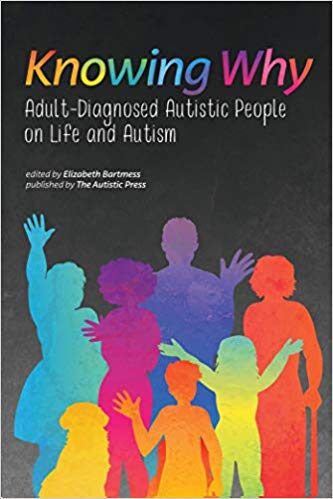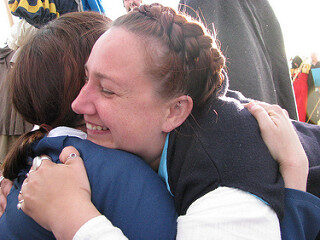“We miss something here. Developmental delay means that much life development happens in adult life for autistics, after age 18 or 21—maybe even more so than it does for us the rest of us.”
Tag: adulthood
Knowing Why is a valuable resource for anyone who has been through the process of being diagnosed or self-diagnosed as autistic in adulthood, anyone who wants to better understand us, and anyone who might be wondering if they might be autistic themselves.
Image © Falashad | Creative Commons [image: Smiling white woman with crown braids hugging a person with an auburn ponytail.] Many families or guardians assume that when high-support autistic teenagers transition to adulthood, they automatically need to be legally conserved for their own protection. But that’s isn’t necessarily true. We spoke with UCSF’s Dr. Clarissa Kripke about why Supported Decision Making can be a better choice than pursuing conservatorship, and the many reasons why. —- Dr. Clarissa Kripke: When people with disabilities and their families start to think about transitioning from child to adult services, they are often encouraged to consider conservatorship. Conservatorship is a legal process where a court appoints an individual or organization to make decisions for an adult. Courts do this after finding that the adult is unable to provide for his or her own needs for health, food, clothing, or shelter. They must be found unable…
Greg Love ageofneurodiversityblog.wordpress.com Waves in Santa Cruz, California. © Wonderlane, Creative Commons [image: Ocean waves breaking on a rocky shore.] It is currently autism “awareness” month, that time of year when autistic people are told that they are costly and burdensome, that they ruin families, and—even worse—that they’re growing in numbers (oh, the horror.) A petition has even circulated, since Donald Trump took over the White House, claiming autism must be declared a “public health emergency.” While these ideas remain disturbingly common, some parents are changing their tune, albeit unfortunately not in ways that actually diverge from “awareness.” Nowadays, parents and professionals are increasingly alarmed at the incoming “avalanche” of autistic adults who will be ill-prepared for the lack of services and supports after high school. It is true that the world scarcely cares to accommodate the support needs of autistic adults—yet at the same time it can no longer…
Susan Senator susansenator.com We had Nat’s ISP meeting today, which is basically an IEP for adults. Although there are fewer requirements for the service providers to fulfill for their clients, Nat’s service provider and also his dayhab/day program staff seem more than eager to outline comprehensive goals for him. Clearly charmed by his intense work ethic as well as his sudden smile and the occasional surprising flash of violet-blue Bambi eyes, his entire team wants to watch Nat soar. Everything I heard pre-22 told me that Autism Adulthood would be the dregs of the universe, but it has been the opposite for Nat. Yes, it is true that Nat has Priority One funding (because of occasional intense episodes of frustration that can become self-injurious) and so he has enough support in his life. He is lucky in that way, lucky in the way that would otherwise be considered unlucky, for…
Charlotte Moore www.ambitiousaboutautism.org.uk Charlotte Moore is an author, journalist and Parent Patron of Ambitious about Autism. Here she writes about her hopes and fears for her son Sam as he moves on from school and in to adulthood. We hope readers will share their own experiences and opinions about this transition period. My son Sam left school in July 2011. Sam has autism with learning difficulties. At 19, he has reached the age at which the government relinquishes responsibility for the education of people like him. I hope I won’t come to look back wistfully at Sam’s school years as a lost golden age. I hope that the home-based timetable I’m in the process of constructing will serve his needs. But I’m daunted to discover how much is down to me. For a long, long time — almost as long as he can remember — Sam has been in a…
Scott Standifer Autism Works National Conference We are in the dregs of winter where I live, and I’ve got the blahs. Everything is cold and grey, the branches are bare, the patches of snow are dirty, and spring seems like it will never get here. Our family’s latest antidote has been listening to a song on one of my son’s old toddler CDs–Bottle of Sunshine by Milkshake. It is a peppy song about a child who finds ways to be unstoppably proactive and creative to entertain herself on days when there is “nothing to do.” (Of course, you can’t really put sunshine in a bottle–that is a metaphor for something fun or cheerful that helps you feel good.) That’s a good metaphor for our upcoming Autism Works National Conference — an antidote for the blahs. There are a lot of people discouraged over the prospects for autism employment right now,…
Susan Senator www.susansenator.com “Well, that was school. I learned a lot.” This is what my husband Ned once imagined our son Nat might be thinking as he rode home from his very first day of school, back in 1993. The school was located in a junior college in the adjacent town; it was a mixed-disability class, as well as having typically developing children. Ned told me that he had no idea what Nat might make of school — it was such a big concept to understand for a three year old, especially one with “Expressive Language Disorder and Autistic-Like Symptoms.” (This was his very first diagnosis; I almost like its quaint and evasive character, in the way that I can look back on almost anything from that long ago with fondness: awww, such a little innocent naive diagnosis.) Even though we prepared him with a Nat Book (known to most…
Sunfell Light-Headed Thoughts I have Aspergers Syndrome. It is not a formal diagnosis — few psychologists will give an adult a formal diagnosis, I’ve discovered. It was not a diagnosis when I was young — I was intellectually brilliant, but also eccentric and odd. I would not look at people when they talked to me, or me to them. I had a ‘funny’ walk (which the military and martial arts repaired). I had a mind like a steel trap, read stacks of books, and was miles ahead of my classmates. My parents were urged to put me ahead a grade or two (they refused). I was told I had the highest “IQ” in the school, then scolded for being a ‘B’ student. But I was too socially awkward to be in any of the cliques, and was mercilessly bullied — so badly that I chose to go into the military…
As Peter Bell (Autism Speaks’ executive vice president for programs and services) reported at the Autism Speaks Blog, While IMFAR is first and foremost a scientific meeting, the meeting has developed into a healthy blend of science and stakeholder perspectives. John Elder Robison reported This year many scientists who have family members on the spectrum proudly wore stakeholder ribbons on their name tags One such scientist/presenter/stakeholder was Matthew J. Carey PhD, known to many as “Sullivan”, who blogs at LeftBrain/RightBrain. While Matt’s day-to-day research has to do with computer hardware, his avocation is writing about autism science. One area in which he excels is analyzing published papers and public datasets bearing on autism. For the 2011 IMFAR meeting, Matt submitted an abstract on the data presented by the National Household Education Surveys Program (NHES) The NHES surveys cover learning at all ages, from early childhood to school age through adulthood.…



